World
Power Analysis: Pogačar’s Outrageous 100km Attack on Worlds Is Crazier Than You Thought
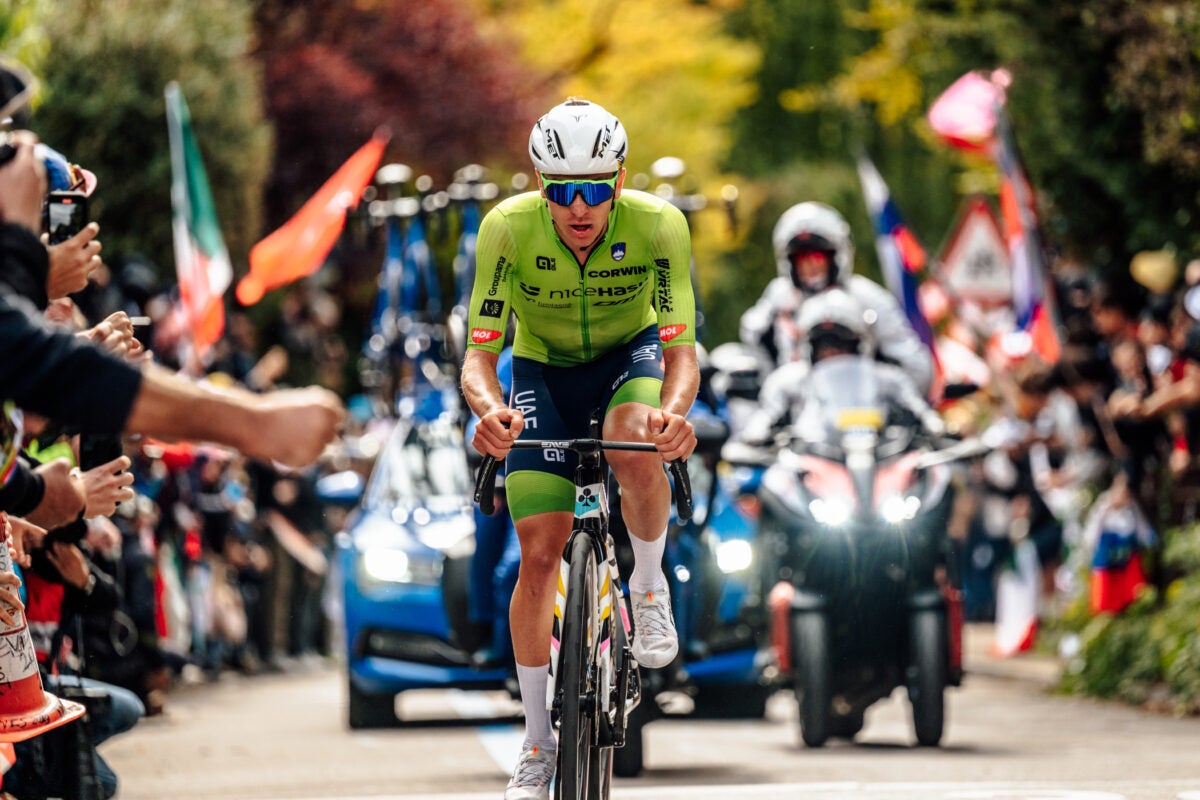
“], “filter”: { “nextExceptions”: “img, blockquote, div”, “nextContainsExceptions”: “img, blockquote, a.btn, a.o-button”} }”>
Get a free Giordana cycling jersey when you subscribe to Velo with Outside+! It’s our way of celebrating the 2024 Road World Championships in Zurich. Includes free shipping. Hurry, ends Sept. 29.
>”,”name”:”in-content-cta”,”type”:”link”}}”>Join now.
Tadej Pogačar is making our lives difficult. How else can we describe yet another incredible solo victory? Pogačar goes solo on the final climb. Pogačar attacks from 50km out. Pogačar wins Strade Bianche with an 81 km solo attack.
Now, we have reached 100 kilometers.
When the 26-year-old attacked with 101 kilometers to go in the UCI Road World Championships, the world held its breath. The Slovenian team director’s heart skipped a beat, UAE Team Emirates let out a gasp, and the world watched as Pogačar slowly rode away from the peloton.
In truth, Pogačar didn’t ride the final 101km solo. He “only” rode the last 50 or so kilometers alone after dropping his trade teammate, Pavel Sivakov, on the Zürichbergstraße. Jan Tratnik had dropped out of the breakaway to help Pogačar reach the front of the race, but I bet Pogačar could’ve won the race on his own.
In the end, Pogačar crossed the line 34 seconds ahead of Ben O’Connor and 58 seconds ahead of defending world champion Mathieu Van der Poel. There was room to spare after spending nearly two and a half hours off the front, and Pogačar became the world champion for the first time in his career. Let’s take a closer look at how it happened.
Before the Attack
With all the focus on Pogačar’s incredible effort, it can be easy to forget about the first four hours of this race. In fact, the Zürich men’s elite road race was the longest world championship in over a decade at 273.9 kilometers with 4,291 meters of climbing. Not only was Pogačar’s attack impressive, but he also did it with more than 160 kilometers of racing in his legs.
Pavel Sivakov was in the break of the day, having followed Jay Vine’s move on the Zürich city circuits. Over the first four hours of the race, Sivakov had a Normalized Power (NP) of 344w (5w/kg), including a peak 12 min NP of 470w (6.8w/kg) halfway through the race.
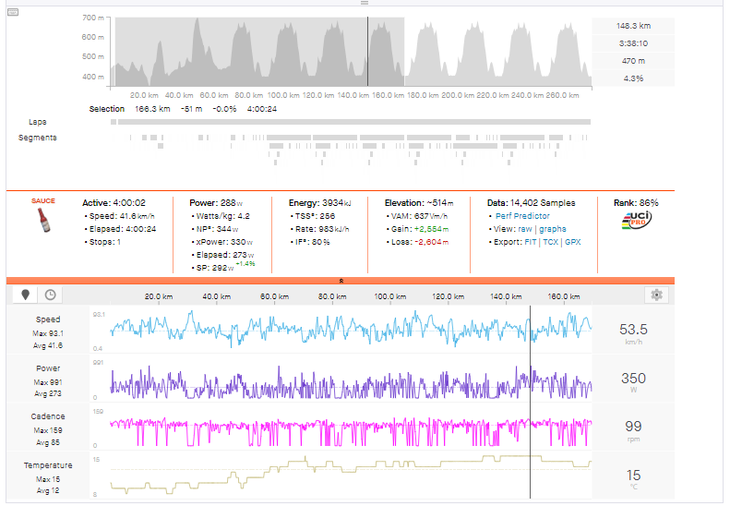
Sivakov – First 166 km of the 2024 Elite Men World Championships Road Race
- Time: 4:00:02
- Average Power: 288w (4.2w/kg)
- Normalized Power: 344w (5w/kg)
- Peak 12 min NP: 470w (6.8w/kg)
Normally, you wouldn’t expect much to happen for the next 50km. The final few circuits would decide the winner, surely. But with 105 km to go, Slovenia came to the front with Doman Novak. Slovenia pushed the pace up the Zürichbergstraße, lining out the peloton ahead of the Witikon. Belgium and Remco Evenpoel were completely out of position as Pogačar made his way to the front.
Partway up the Witikon, Pogačar threw down a seated acceleration that hardly anyone could follow. It didn’t look like much on the television, but it was a brutal acceleration. Only Quinn Simmons (USA) and Andrea Bagioli (Italy) could stay on Pogačar’s wheel, but even that didn’t last very long. Simmons was pushing over 550w on Pogačar’s wheel, but he couldn’t hold the pace to the top of the climb. Bagioli made it a bit further, but the Italian, too, succumbed to the pace.
Most of the media attention has focused on Pogačar’s 101km attack, but this 2km section of the race was a ridiculous performance all by itself. Just look at the peak four-minute power and 1,000w spikes that Simmons did trying to follow Pogačar on the Witikon.
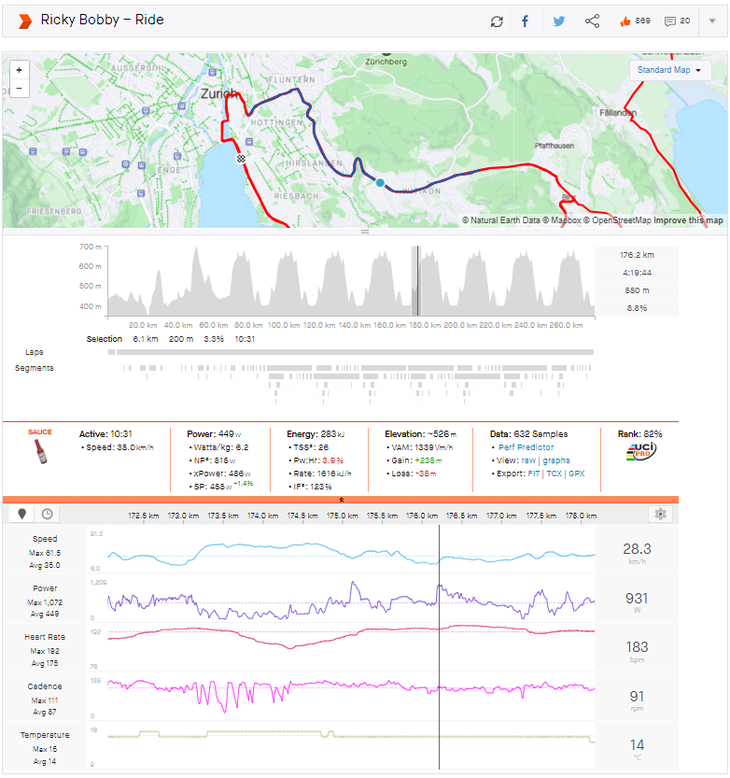
Simmons – Attempting to Follow Pogačar’s Attack
- Time: 10:31
- Average Power: 449w (6.2w/kg)
- Normalized Power: 515w (7.1w/kg)
- Peak 4 min Power on the Witikon: 550w (7.5w/kg)
From bottom to top, Pogačar’s effort on the Witikon and ensuing plateau lasted about six-and-a-half minutes. He put nearly 20 seconds into the peloton, who were strung out in single file trying to chase down the Slovenian. The relatively shallow gradients and significant headwind make it difficult to estimate Pogačar’s power, but we can see from Simmons’ numbers that Pogačar must have been pushing around 8w/kg to drop those riders straight off his wheel.
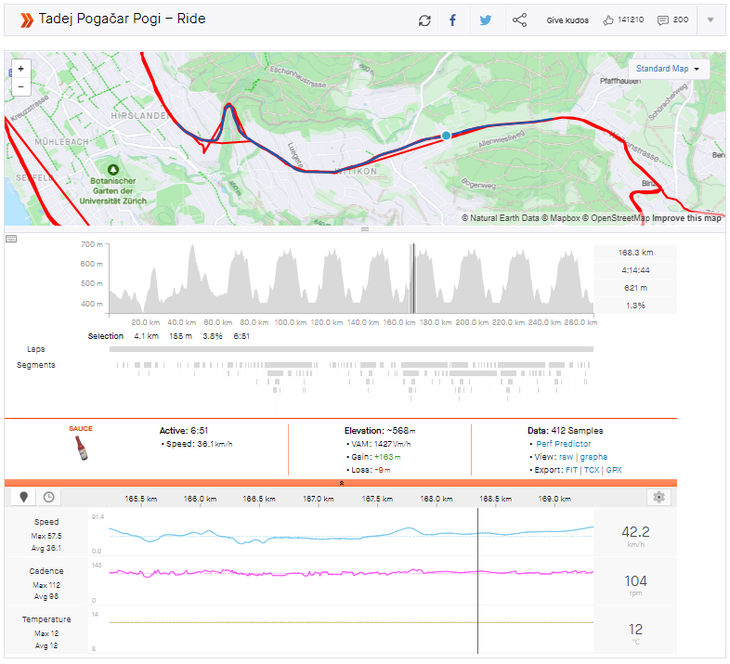
Pogačar – Full Attack Mode on the Witikon
- Time: 6:51
- Estimated Average Power: ~515w (7.9w/kg)
As Belgium and the Netherlands attempted to organize a chase, Pogačar picked up Jan Tratnik on his way to the breakaway. The fellow Slovenian pulled Pogačar across as quickly as he could, and it took less than half a lap for Pogačar to reach the front of the race.
With over 70km to go, Pogačar led the breakaway onto the Zürichbergstraße, the steepest climb in the race with a deceptively shallow average gradient of 5.4 percent. What is really crazy about Pogačar’s attack is how much he had left in the tank after each acceleration. After attacking the best cyclists in the world and bridging across the breakaway, Pogačar decimated the group over the next five kilometers.
Sivakov was the only rider who could stay with Pogačar, and the Frenchman pushed nearly 500w for eight minutes on Pogačar’s wheel. This was Sivakov’s biggest effort of the race — by far — and he was in Pogačar’s draft for the entire effort.
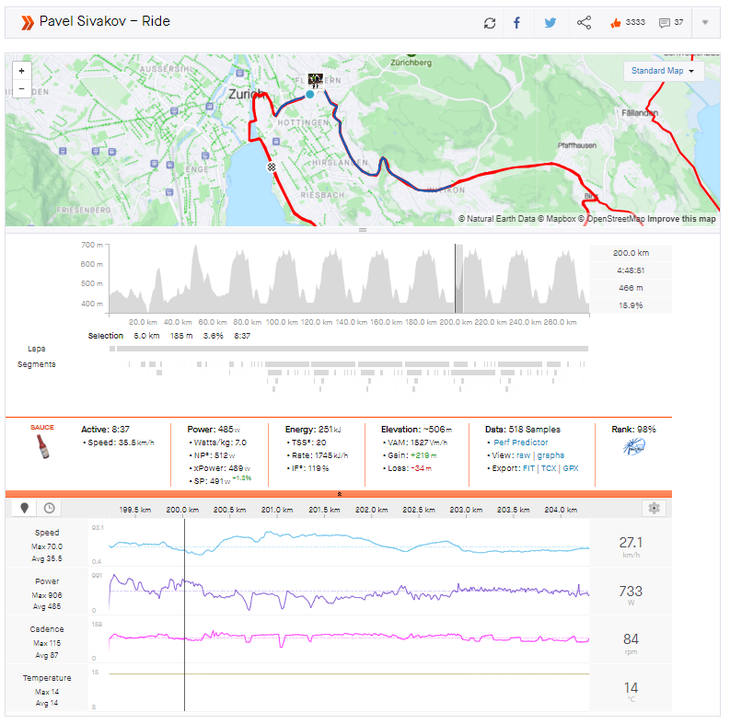
Sivakov – Following Pogačar with 70km to go
- Time: 8:37
- Average Power: 485w (7w/kg)
- Normalized Power: 512w (7.4w/kg)
- Zürichbergstraße: 1:54 at 641w (9.3w/kg)
- Witikon: 4:38 at 483w (7w/kg)
On the next lap, Pogačar went solo ahead of Sivakov, and there was still 51 km to go. There isn’t much to write home about regarding the last 51km. Pogačar never had more than a minute on the nearest chasers. That group ebbed and flowed, but it mostly contained the likes of Remco Evenepoel, Mathieu Van der Poel, Ben O’Connor, and so many other star-level riders.
Even when Pogačar seemed to be suffering in the final 25km, he never ceded more than a handful of seconds to the chasers. During his epic attack, Pogačar averaged 44.3 kph for nearly two and a half hours. That included four laps of the Zürich city circuits and more than 1,700 meters of climbing.
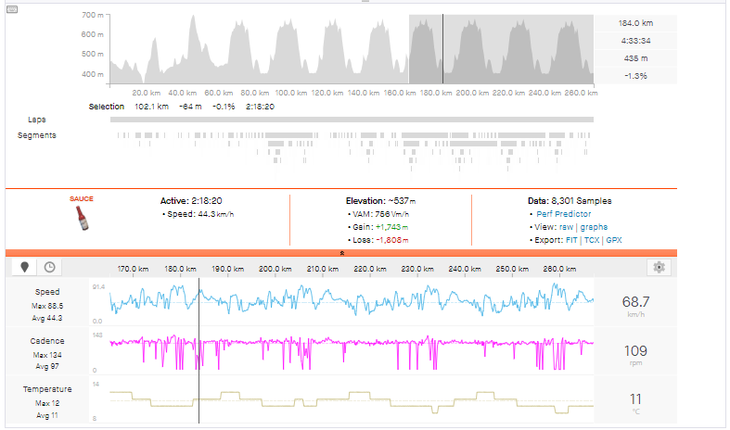
Pogačar – 101km Attack to Win the World Championships
- Time: 2:18:20
- Average Speed: 44.3 kph (27.5 mph)
- Elevation Gain: 1,743 meters (5,718 feet)
Having just won the rainbow jersey, Tadej Pogačar only has a few races left until he has collected all of cycling’s most important events: Milan-San Remo, Paris-Roubaix, and the Vuelta a España remain beyond his grasp, for now.
His 2024 season will go down in cycling history, and it’s not even over, with Il Lombardia coming up on October 12. The scary part is that Tadej Pogačar is getting better. He is a better climber, puncheur, and time trialist than he was four years ago when he won his first Tour de France. They say the sky’s the limit, but I don’t even think even the sky would’ve attacked with 100km to go.
Power Analysis data courtesy of Strava
Strava sauce extension
Riders:










